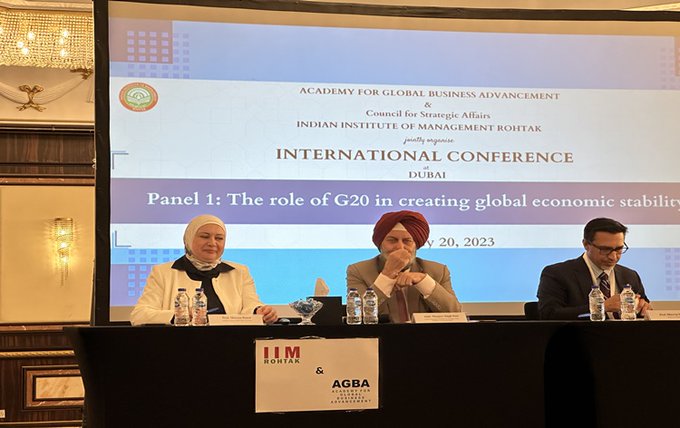Last Updated on May 21, 2023 2:39 pm by INDIAN AWAAZ

AMN / WEB DESK
A panel discussion held in Dubai shed light on the vital role of the G20 in creating global economic stability. The event took place on the sidelines of the International Conference jointly organized by the Indian Institute of Management Rohtak, Academy for Global Business Advancement, and Council for Strategic Affairs.
The panelists, including Manjeev Singh Puri, former ambassador of India to Nepal, Prof Tatiana Karabchuk from UAE University, and Prof Mayssa Banat from Rafik Hariri University in Lebanon, provided valuable insights into the significance of the G20 in the current international order. The discussion was moderated by Prof. Dheeraj Sharma, the Director of IIM Rohtak.
The panelists unanimously highlighted the multifaceted role played by the G20 in creating global economic stability and fostering inclusive global growth and development. The G20 plays a critical part in ensuring financial stability, promoting growth, and effectively managing and preventing crises. As developing economies become increasingly integrated into the global economy, the G20 strives to achieve strong, sustainable, balanced, and inclusive global growth.
During the discussion, Ambassador Manjeev Singh Puri drew attention to the evolving global perception of India. He emphasized the G20’s ability to bring together leaders from the world’s largest economies, enabling effective decision-making and implementation through national and multinational systems. Despite lacking de jure power, the G20 possesses significant de facto power, making it a key driver of positive change on the global stage.
The panelists also delved into specific areas where the G20 can make a significant impact. Prof Tatiana Karabchuk emphasized the importance of public opinion polls for informed decision-making. She also highlighted the recognition of online courses in the global educational landscape, suggesting that the G20 could play a pivotal role in implementing necessary changes in this area. Prof Mayssa Banat focused on the extraordinary power of global language education, stressing how language barriers can be overcome and the key role language plays in transcending cultural divides. She further emphasized the contribution of language education to shaping global economic policies.
Prof. Dheeraj Sharma, the moderator, emphasized the need for management scholars to examine pertinent and timely problems, such as the food grain crisis resulting from the Russia-Ukraine conflict. He also highlighted the importance of exploring alternative trade routes for global businesses and ensuring the smooth functioning of the global supply chain.Prof Sharma spoke about the successful Indian G20 presidency and its impact on developing countries. He highlighted how the Indian presidency instilled an achievement orientation among developing nations and encouraged cooperation based on need rather than power. The Indian presidency of the G20 has effectively balanced de jure and de facto power within global institutions.
The panel discussion showcased the diverse aspects of the G20’s role and its potential to shape global economic stability. With its focus on inclusive growth, financial stability, and crisis management, the G20 continues to play a crucial role in fostering cooperation among major economies and driving sustainable development on a global scale
